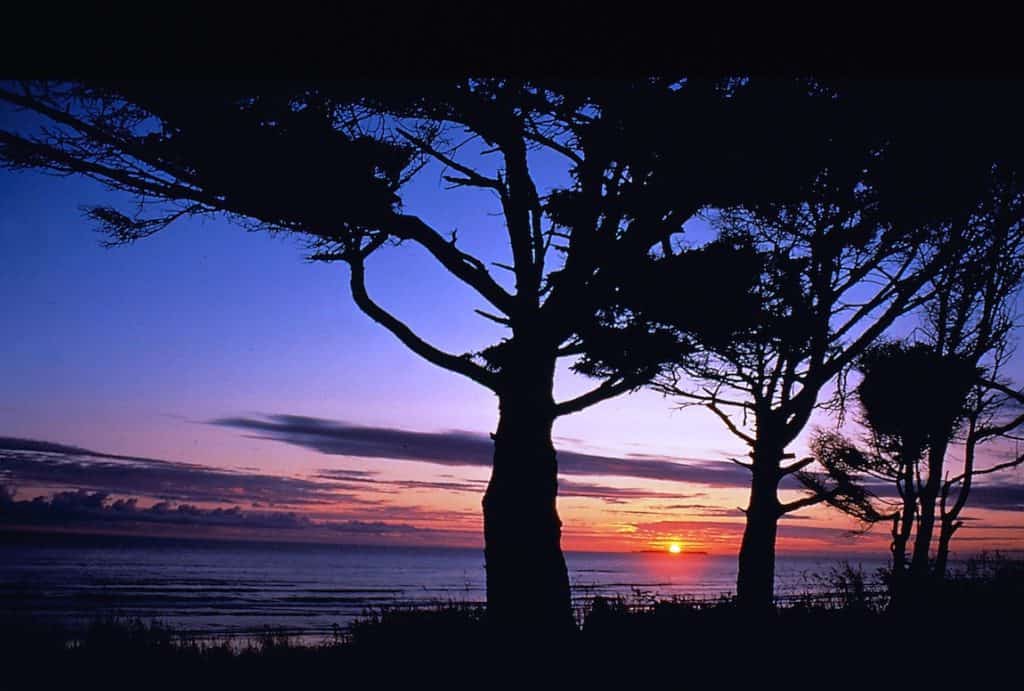
Located on a peninsula in Washington, Olympic National Park features over 1,440 square miles of wilderness. Within two hours of Seattle, this park is a year-round destination and centered around the Olympic Mountains. Visitors will find several ecosystems, like mountaintop meadows, old-growth rainforests and beaches. Here are the top things to do in One Day at Olympic National Park.
11 Top Things to Do in Olympic National Park
-
Hike through the Lake Quinault Rain Forest
-
Go Canoeing on Lake Quinault
-
Visit the Olympic National Park’s Beaches
-
Go Tidepooling at the beach
-
See the Hoh Rainforest
-
Marvel at the Moss on a Rainforest Hike
-
Soak at Sol Duc Hot Springs
-
See Mount Olympus
-
Take a Hike through a Wildflower Meadow on Hurricane Ridge
-
Earn a Junior Ranger Badge
-
Spend the Night
Olympic at a Glance
| Year Established: 1938 |
| Located: Washington |
| Size: 1,442 square miles |
| Top Features: Rainforests, Beaches, Lakes and Mountains |
3 Day Olympic National Park Itinerary
Why Visit Olympic National Park
This national park is one of the most convenient to a major city with its services and airport: Seattle. With Mt. Olympus in the center, this park is home to several distinct ecosystems. From the glaciers at Mt. Olympus to the wildflower meadows, visitors can enjoy Alpine and Sub-Alpine environments.
Olympic National Park offers forests as well, and visitors will find Douglas Fir, Hemlocks and Huckleberries. A unique forest of Olympic is the Temperate Rainforest, found at both Lake Quinault and Hoh, and each receives about 140 to 167 inches of rain a year.
Between the mountains and rainforests, visitors to the park can also enjoy the wind-swept beaches. It is home to several developed areas, and tide-pooling is popular. For water recreation, guests can visit the lakes in the park. Both Lake Quinault and Lake Crescent offer lake rentals, like SUP and kayaks.
During my visits to the Olympic National Park, I explored all the areas. I really appreciated that I could visit several different areas in one day. The Sol Du Lac Hot Springs was the perfect end to any day in Olympic.
One Day at Olympic National Park
This park is huge, and U.S. 101 circumvents it. In fact, Olympic occupies nearly the entire peninsula, so don’t try to see it all in one day.
Instead, concentrate on one area, like the southern area. Visitors can start with a hike through the rain forests at Lake Quinault with its old-growth forests and lake activities. Then, do some tide pooling on the Pacific Ocean.
Alternatively, the northern area offers Hurricane Ridge, then visitors can explore the Lake Crescent area. Finally, end the day with a soak in the hot springs at Sol Duc. Each route offers hiking, concessions and a visitor center or ranger station. Both are about a two-hour drive from Seattle.
Note: Due to the 2023 fire, the Visitor Center at Hurricane Ridge is closed. The only services at the site are portable toilets and a visitor contact station. There is no potable water or concessions available at Hurricane Ridge.
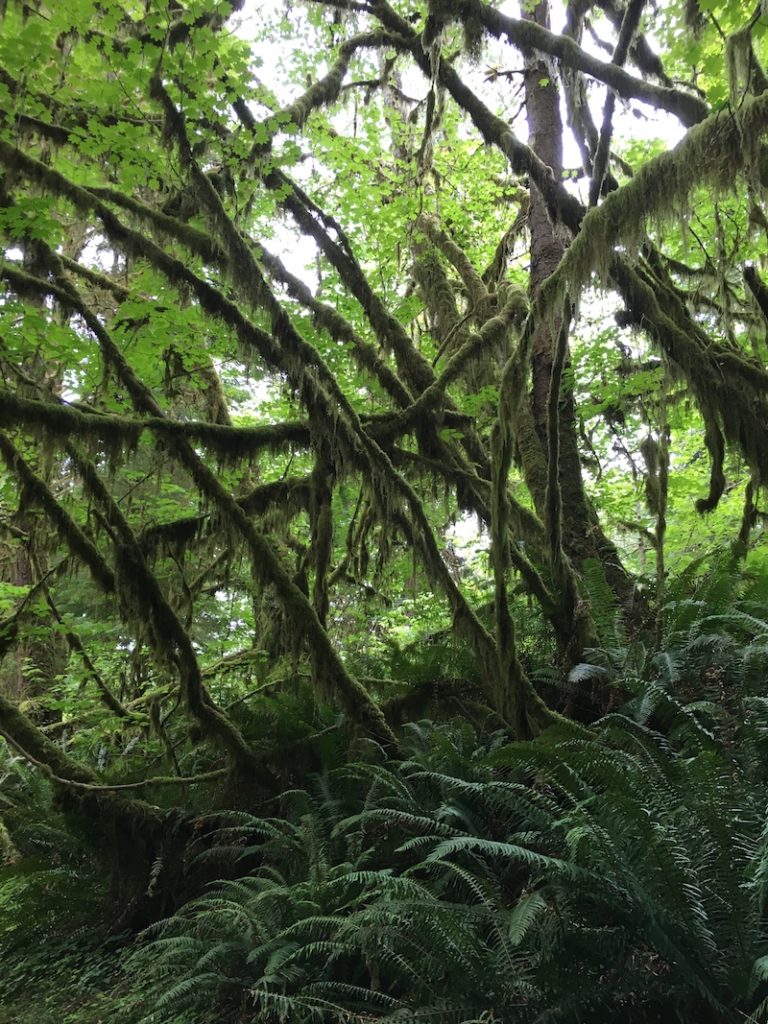
Lake Quinault Rain Forest
The temperate rainforests offer shaded trails dripping with moss in every shade of green. This area is a must if entering Olympic National Park from the south.
My kids loved hiking along the rainforest trails where streams and small waterfalls break the silence of the spruce and cedar forests. Additionally, find water activities at Lake Quinault.
Hiking around Lake Quinault
Lake Quinault offers trails, a ranger station and a general store for snacks.
Rain Forest Trail–A .5-mile loop
Graves Creek Nature Trail–A 1-mile loop
Quinault Loop Trail–A 4 to 8-mile loop trail
Be sure and hike to the world’s largest Sitka spruce on the .3-mile trail, located close to the Lake Quinalt Post Office.
Water Sports at Lake Quinault
Lake Quinault offers SUPs, kayaks and canoes for rent by the hour or by the day. Lake Quinault also offers three different guided boat tours.
The National Parks Guide to Washington
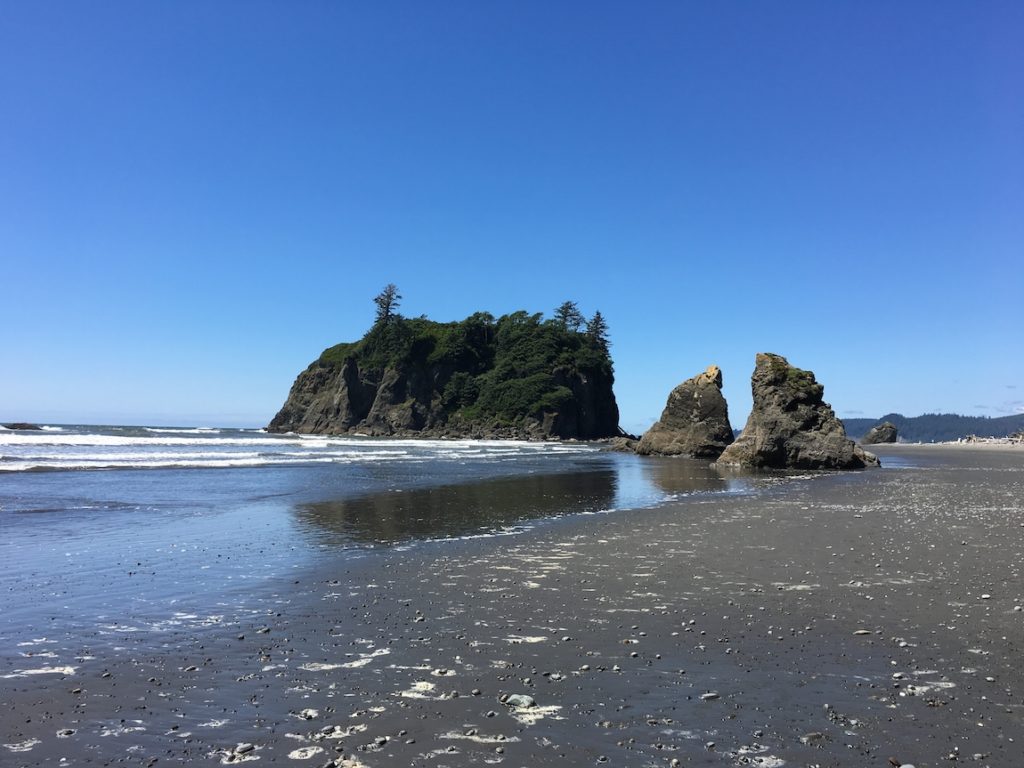
The Beaches of Olympic National Park
Olympic National Park touches the Pacific Ocean on the west side. Tide pools and rugged beaches dominate the landscape. Stop by the Kalaloch Ranger Station (open seasonally) for a special Junior Ranger booklet to complete while exploring the beach.
Tide Pooling in Olympic
Rudy Beach and Beach 4 offer tide pool opportunities. Be sure to check on the low tide times at the ranger station. My kids loved exploring the tide pools, looking for ribbed limpets, acorn barnacles and giant green anemones even more than hiking in the rainforest.
Kalaloch Beach offers a campground, lodging and a restaurant, along with an expansive sandy beach. Ruby Beach offers more parking than Beach 3 and Beach 4. All beaches are conveniently located along U.S. Route 101.
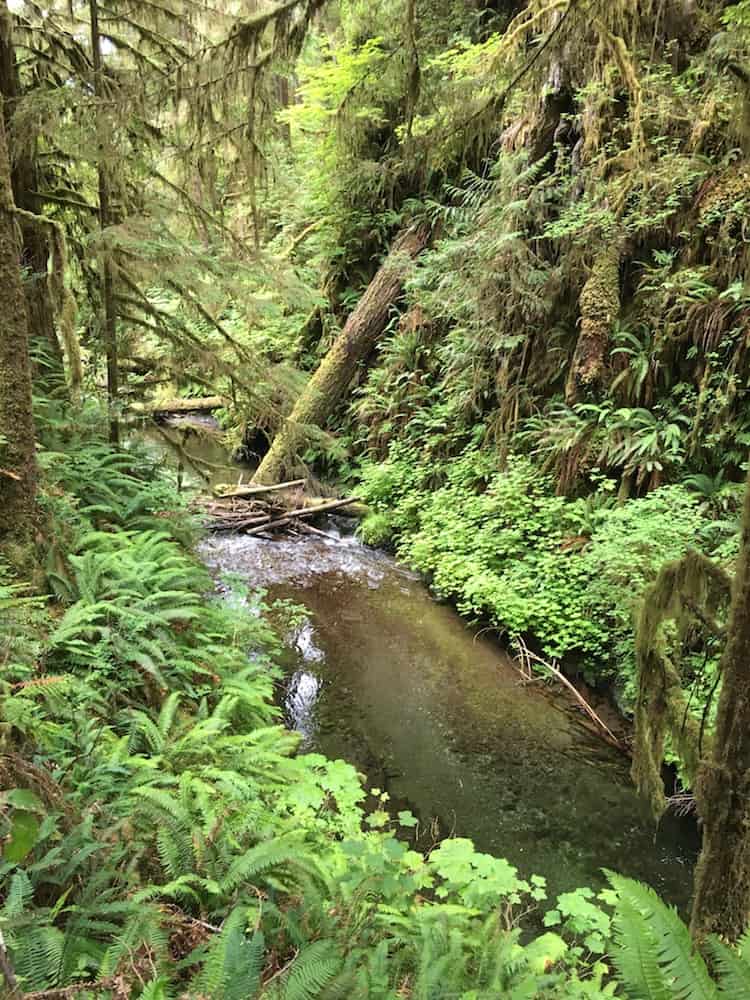
Hoh Rain Forest Area
With 140 inches of annual rain, the conifers and deciduous trees are dripping with green moss. Hiking through the rainforest is the best way to see it.
Hiking in the Hoh Rain Forest
Find two hiking trails near the Visitor Center.
Hall of Mosses Trail—a .8-mile trail
Spruce Nature Trail—a 1.2-mile trail
For longer trails, try the Hoh trails. Both require advance preparation and the use of bear canisters.
Hoh River Trail–a 17.3-mile wilderness hike.
Hoh Lake Trail–a 6.4-mile trail.
The Hoh Rain Forest Visitor Center offers maps and information, but no food. Located at 18113 Upper Hoh Rd. It is open daily in the summer and has varying days and hours for the rest of the year. Closed in January and February.
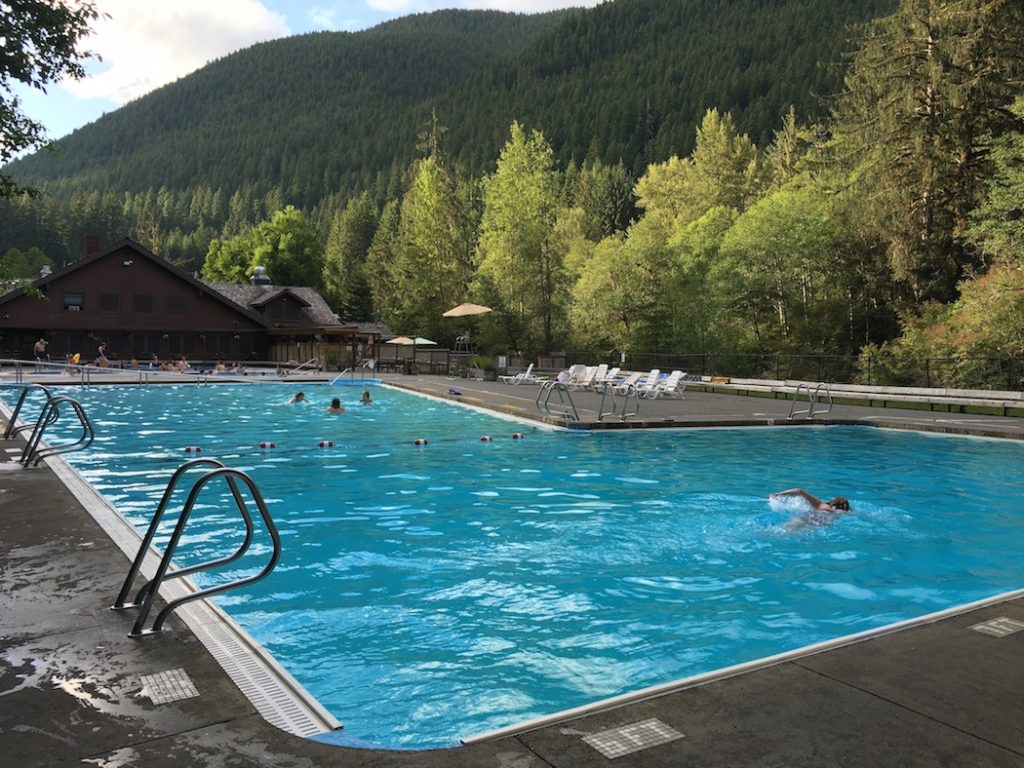
Soak at Sol Duc Hot Springs
After a long day of hiking, soak in mineral-rich hot springs at Sol Duc Hot Springs Resort. This family-friendly resort offers a fresh-water swimming pool and three small soaking pools. It also has changing rooms, a restaurant, cabins and lodge rooms.
Each pool offers a different temperature. The smallest pool starts at 99F/37C. The medium pool is 104F or 40C. The largest soaking pool is 101F/38C. The swimming pool’s temperature varies with the season from 50 to 85F/10 to 30C.
My kids spent the majority of their time in the freshwater pool while I relaxed in the hot springs. I could keep an eye on them while soaking. Kids under 4 must remain in the coolest hot spring pool.
Located at 12076 Sol Duc Hot Springs Rd. Open daily from 8 a.m. to 9 p.m. (and 9 p.m. in the summer) from late March until the end of October. Each session is 1 1/2 hours. Adult session admission is $18 and kids 4 to 11 are $12.
San Juan Island Getaway in Washington
Lake Crescent
Lake Crescent is located 20 miles east of Port Angeles, Washington. The glacial blue water of Lake Crescent is surrounded by evergreen forests making a stunning landscape.
Visit Storm King Ranger Station (open seasonally) for information and a starting point for several hikes. Head to Bovee’s Meadow for picnic tables. Grab-and-go food is available at Log Cabin Resort. Picnic and camping supplies are at the Fairholme Store.
Water Sports at Lake Crescent
Rent a paddleboard, kayak or canoe at Lake Crescent Lodge by the hour or day. Explore the clear lake.
Boat tours are also available. The guided tour departs from Lake Crescent Lodge and lasts an hour and a half.
Hiking around Lake Crescent
Marymere Falls–A .9-mile trail, one way departing from Storm King Ranger Station for a stunning view of the 90-foot waterfall.
The Moments in Time Nature Trail–A .6-mile loop, perfect for those wanting a shorter hike.
Top Western Mountain Destinations for Families
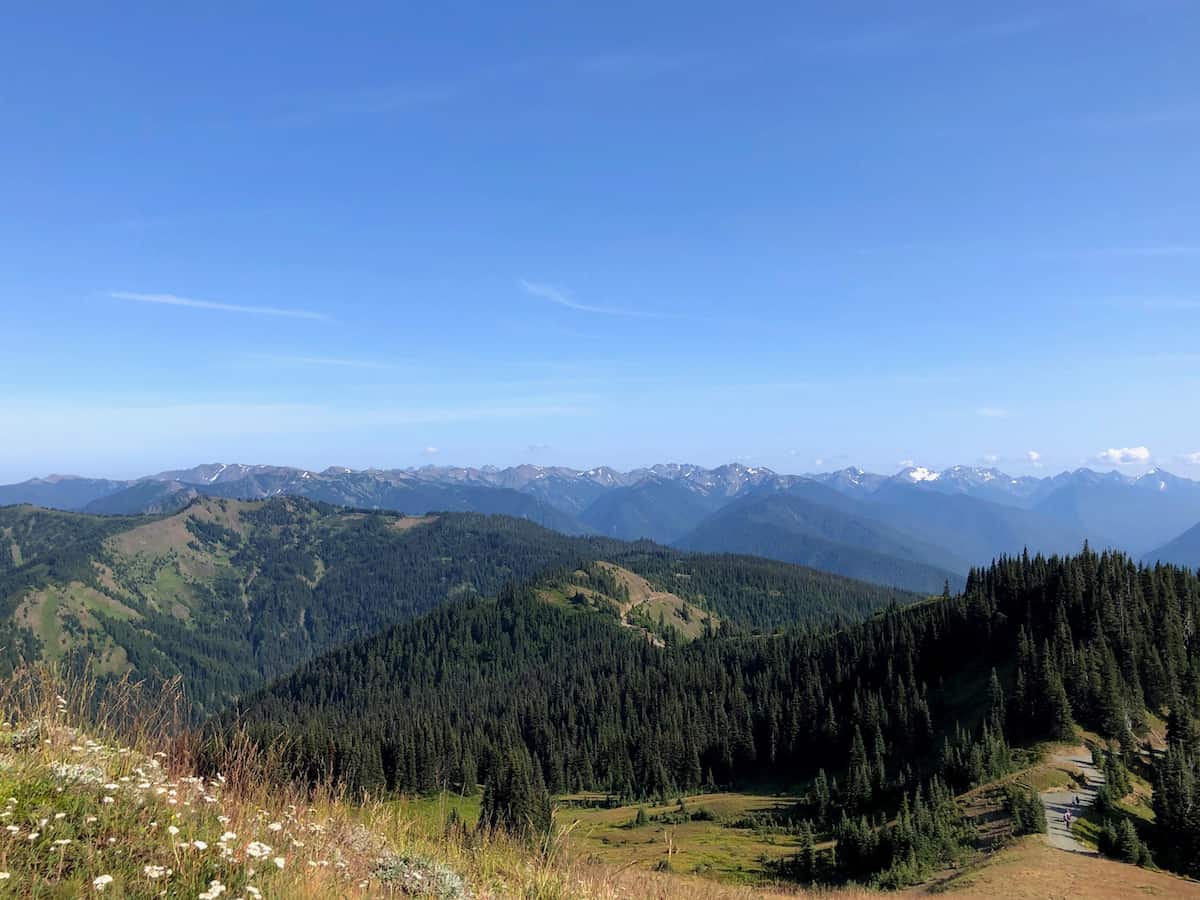
Hurricane Ridge
Note: Due to the 2023 fire, the Visitor Center at Hurricane Ridge is closed. The only services at the site are portable toilets and a visitor contact station. There is no potable water or concessions available at Hurricane Ridge.
The towering peak of Mount Olympus rises up to 7,980 feet, and is the tallest point in the Olympic National Park. Part of the Olympic Mountain Range, it’s home to 266 glaciers. Alpine wildflowers that sway in the mountain breezes make Hurricane Ridge a favorite with visitors.
Hurricane Ridge offers visitors the only accessible viewpoint of the Olympic Mountains, 17 miles from Port Angeles. The drive to Hurricane Ridge takes about an hour. First, you drive through old-growth forests as the road ascends the tree line. Then, you find meadows with wildflowers during the summer or covered in snow in winter.
Hiking around Hurricane Ridge
Find several hiking trails near the Hurricane Ridge Visitor Center.
Meadow Loop Trail—Trails from .25 to .50 miles depart from the parking lot.
Hurricane Hill—A 1.6-mile one-way trail that departs from the end of Hurricane Ridge Road. 700-foot elevation gain.
Klahhane Ridge—A 2.8-mile trail that joins the Klahhane Ridge Switchback Trail. Departs from the Visitor Center.
Located 17 miles south of Port Angeles, open daily during the summer. Weekends only during the winter due to snow.
There is a shuttle service to Hurricane Ridge, the Clallam Transit offers a shuttle to Hurricane Ridge. It takes 45 minutes, and each fare is $1 each way for adults with kids 18 and younger riding for free. It is offered from late June until early October.
Planning Guide to Glacier National Park
History of Olympic National Park

A British Captain gave Mount Olympus its name back in the 1700s, though the Native Americans, like the Quinault and the Hoh, lived and hunted on the peninsula for millennia before. Theodore Roosevelt protected the Olympic Peninsula as a national monument in 1909. After a visit in 1937, Franklin D. Roosevelt designated the monument a national park in 1938.
Olympic National Park offers three distinct ecosystems to explore. For this reason, The United Nations designated it a biosphere reserve in 1976 and later proclaimed it a UNESCO World Heritage Site in 1981.
Best Alaskan Cruises for Families
Lodging in Olympic National Park
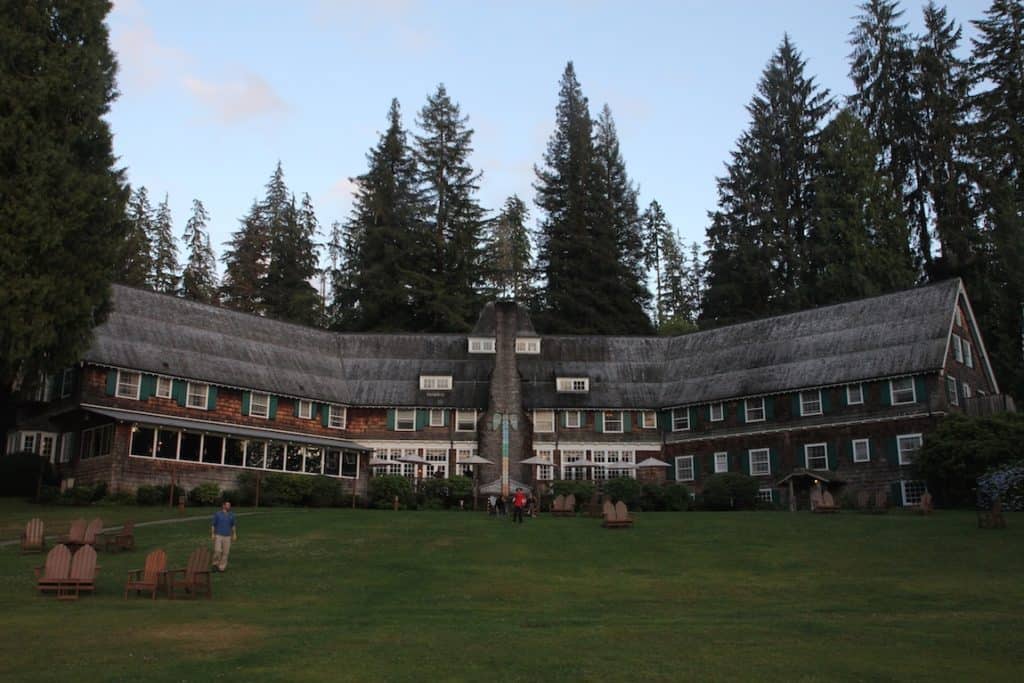
During my visit to the Olympic National Park, I stayed at Lake Quinault Lodge, located on the southern edge of Lake Quinault in the Olympic National Forest. Featured on the PBS series, Great Lodges of the National Parks, it offers modern amenities and kids’ activities in a family-friendly environment.
The north side of Olympic National Park offers several options, from the rustic to the refined. Lake Crescent Lodge also offers gracious rooms in a historic lodge. Log Cabin Resort offers family-friendly camping cabins and kayaks. Sol Duc Hot Springs offers lodging close to the Hot Springs pool.
Lake Quinault Lodge Review
Olympic National Park with Kids and Pets
Junior Ranger Badges
The Junior Ranger Program allows families to discover a national park site together in about two hours. Olympic National Park offers kids several Junior Ranger patches and badges to earn during their visit.
Find Olympic National Park Junior Ranger booklets at visitor centers and ranger stations. At the visitor center, kids can check out a Discovery Packet, a backpack filled with field guides, binoculars and a magnifying lens to explore Olympic National Park more thoroughly.
The Ocean Stewards Patch guides kids 4 and up through the diverse marine life in the park. And kids get a souvenir patch.
BARK Rangers
Olympic National Park welcomes pets as long as they practice the principles of the BARK program.
B–Bag waste and dispose of it in the trash
A–Always leash your dog for their safety and others
R–Respect wildlife
K–Know where you can go
Dogs are allowed at the following places in Olympic National Park.
- Peabody Creek Trail (Olympic National Park Visitor Center in Port Angeles)
- Rialto Beach parking lot to Ellen Creek (1/2 mile)
- The beaches between the Hoh and Quinault Reservations (Kalaloch area)
- Madison Falls Trail (Elwha)
- Spruce Railroad Trail (North shore of Lake Crescent)
- July Creek Loop Trail (North shore of Lake Quinault)
Guide to Junior Ranger Badges
Where’s Olympic National Park
Olympic National Park is on the Olympic Peninsula, west of Seattle, Washington. Port Angeles and Forks, Washington, offer services for travelers, like gas, groceries and lodging outside of the park.
Quinault Rain Forest Ranger Station at the southern entrance of Olympic National Park is 146 miles from Seattle-Tacoma International Airport (SEA or SeaTac as the locals call it). Hurricane Ridge Visitor Center, in the northeast portion of the park, is 147 miles away from the airport.
There is no reliable public transportation around the park. However, private tour companies offer tours.
Getting Around Olympic National Park
Olympic National Park is open 365 days a year and 24 hours a day. You can purchase an America the Beautiful annual pass ($80) or a 7-day pass for $30 per vehicle.
Olympic National Parks is not a drive-through park, meaning roads don’t bisect it. U.S. Route 101 wraps around the Olympic Peninsula and parks roads dead-end at ranger stations or visitor centers.
Guide to National Park Passes
Know Before You Go:
- Olympic National Park doesn’t have roads that bisect the park.
- Be prepared for rain; carry rain jackets at all times.
- If swimming at Sol Duc Hot Springs, limit the time kids soak in the hot springs pools; usually, an hour is enough.
- Olympic National Park is a bear habitat.
Be Bear Aware
The National Park Service recommends the following guidelines to reduce encounters.
- Make noise when hiking, kids are good at this.
- Be aware of the possibility of bears at streams.
- Store food when not eating or preparing in the bear-proof storage lockers.
- Keep 100 years between you and the bears.
- Put all trash in a bear-resistant trash container.
Best National Park Books
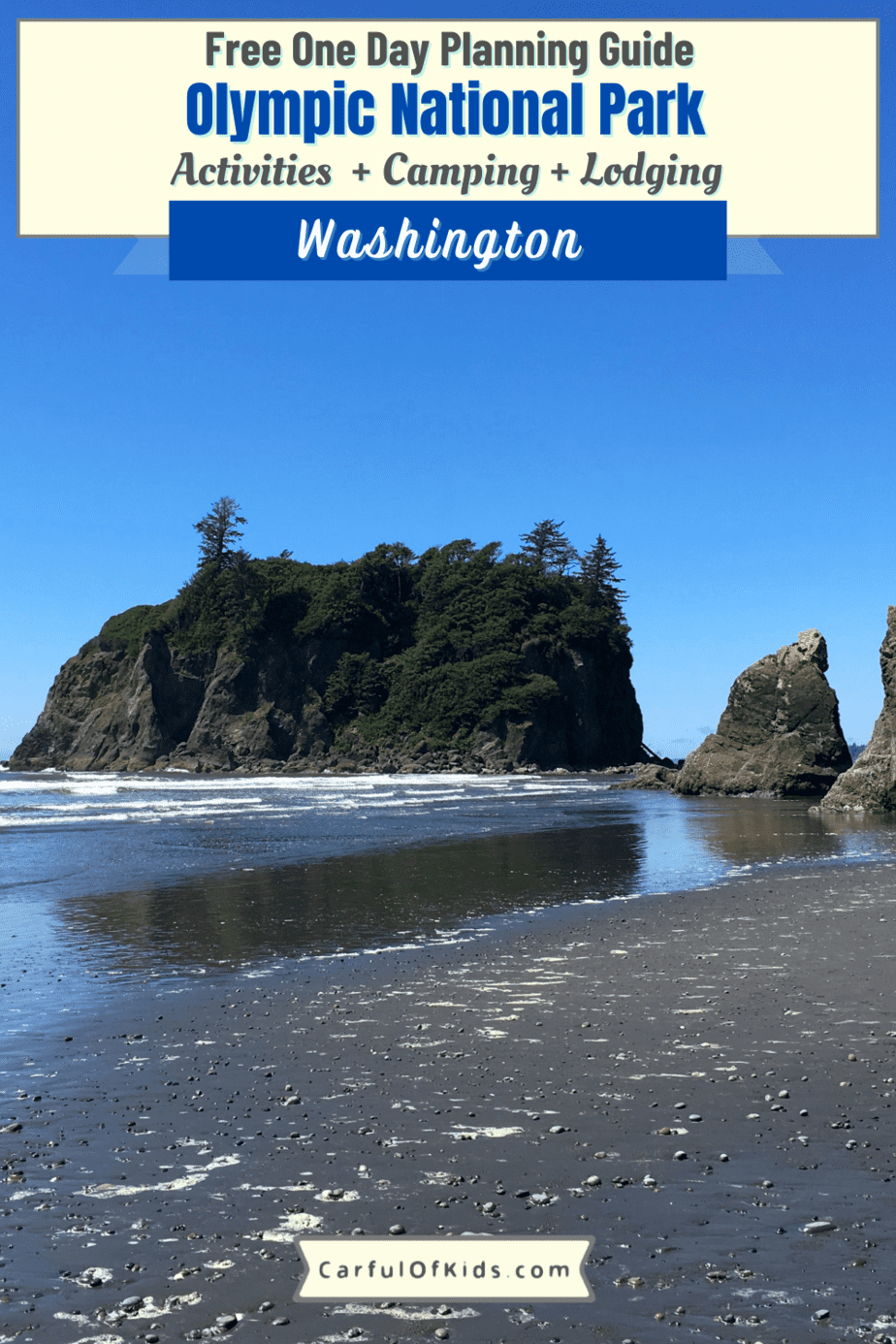

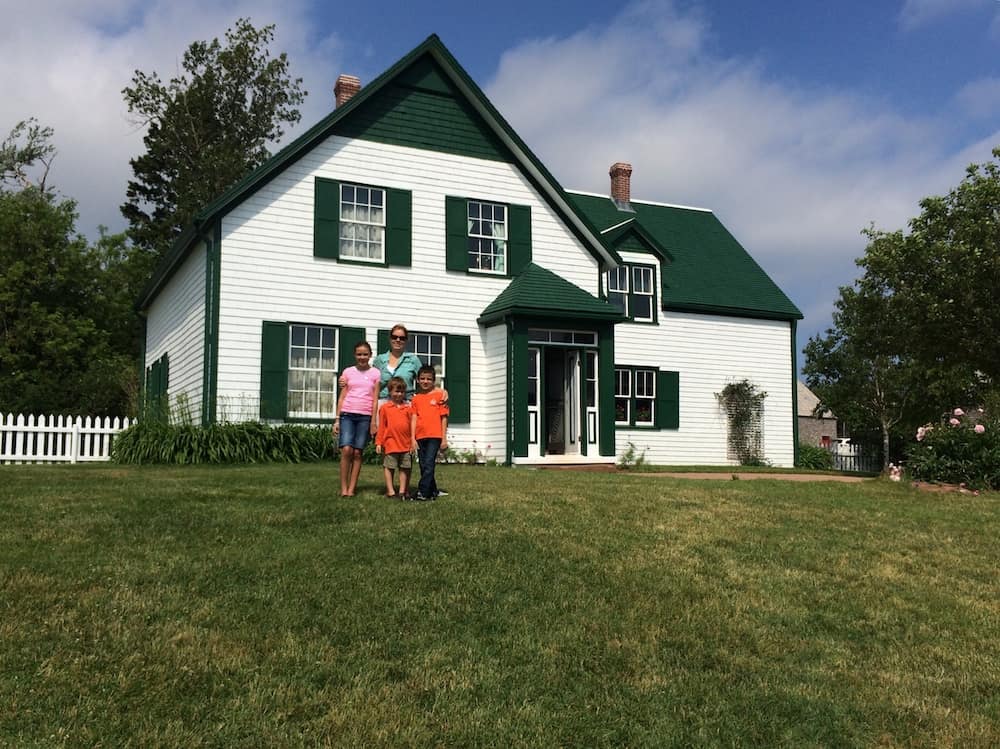
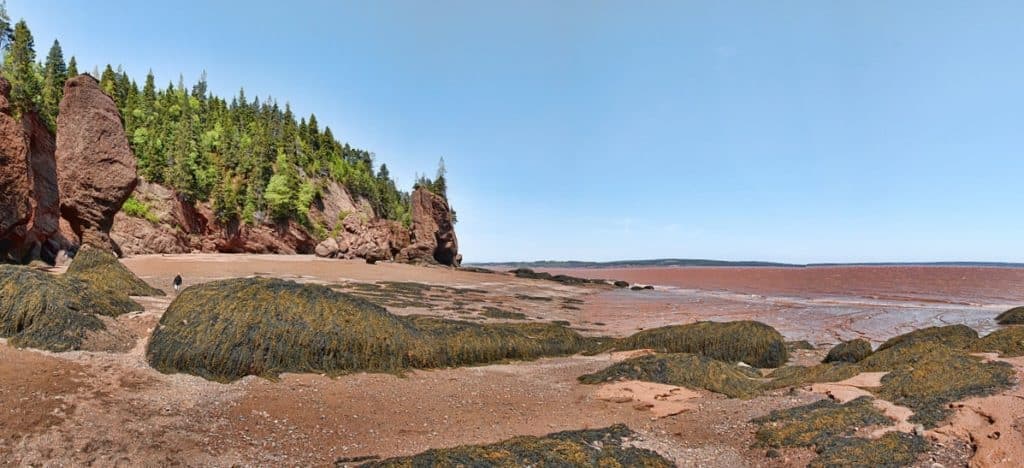
Comments are closed.